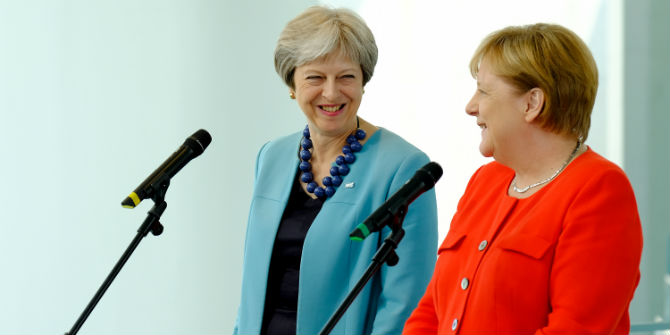
 The way that EU27 citizens in the UK have been used as bargaining chips in the Brexit negotiations is woeful. Unfortunately, write Ruvi Ziegler (University of Reading) (left) and Brad Blitz (Middlesex University and LSE), the EU has not helped matters by conceding that the rights of UK citizens living in the rest of the EU were negotiable, too. This undermines the principle of freedom of movement, which is a fundamental tenet of the EU. When it meets on 14 December, the European Council should end this deplorable state of affairs and guarantee the rights of UK citizens in the EU, thereby putting the ball squarely in Britain’s court.
The way that EU27 citizens in the UK have been used as bargaining chips in the Brexit negotiations is woeful. Unfortunately, write Ruvi Ziegler (University of Reading) (left) and Brad Blitz (Middlesex University and LSE), the EU has not helped matters by conceding that the rights of UK citizens living in the rest of the EU were negotiable, too. This undermines the principle of freedom of movement, which is a fundamental tenet of the EU. When it meets on 14 December, the European Council should end this deplorable state of affairs and guarantee the rights of UK citizens in the EU, thereby putting the ball squarely in Britain’s court.
Do EU citizenship rights matter? This is the question the European Council needs to answer when it meets this month. The answer is vital not only to the Brexit negotiations, but to the future of the European Union itself.
Since the Maastricht treaty, signed just over 25 years ago, the right to the free movement of persons has formed the basis for substantive EU citizenship rights. Today, EU citizenship means much more than allowing EU nationals to work in another Member State. In addition to a series of political rights, the scope of EU citizenship applies to dependents of EU citizens, and under certain circumstances to other family members as well.
Millions of people have moved across EU Member States where they have built careers, founded families, and established a social identity as EU citizens. As the European Parliament affirmed in October, EU citizens who took up residence in another EU Member State did so on the basis of rights under EU law and on the understanding that they would continue to enjoy those rights throughout their lives.

That presumption is no longer secure. As negotiations over the UK’s withdrawal gather pace, citizenship rights are also up for grabs.
Many blame Britain for this state of affairs. They have good reason to do so. In June, the UK government published a policy paper which suggested that the future rights of EU27 citizens currently in the UK depended on reciprocal commitments agreed with the EU institutions. In her Florence speech in September, Theresa May offered to give protections for EU27 citizens living in the UK in the withdrawal agreement. What she did not say was that her government has inserted a clause into the UK’s EU (Withdrawal) Bill which, if passed unamended by the Westminster Parliament, would give a minister – not Parliament – free rein to limit or remove the rights that domestic law presently grants to EU27 citizens.
After eight months of negotiations, it is still difficult to divine the UK’s intentions. Theresa May’s cabinet have repeatedly contradicted her – and each other. When pressed in a radio interview last month she was unable to unequivocally assure EU27 citizens in the UK that, in the event of a ‘no deal’, their rights will be maintained.
Unfortunately, the UK is not alone. When the European Council agreed in April to enter into Brexit negotiations with the UK government, both sides conceded that citizenship rights were negotiable. The rights of EU citizens on both sides of the Channel were put on the table alongside the question of the UK-Irish border and the financial settlement of the UK’s obligations. As a result, rights are treated like tradable commodities. In its guidelines of 28 April 2017 authorising the withdrawal negotiations, the Council outlined the principle that ‘nothing is agreed until everything is agreed’ and that individual items including citizenship rights could not be settled separately.
By continuing with the current mandate, both the European Council and the UK government are potentially violating the rights of millions of EU citizens. As Dimitrios Giannopoulous has argued before the House of Lords’ EU (Justice) sub-committee, the creation of prolonged uncertainty and distress as a result of the Brexit negotiations may itself be a violation of the right to family and private life in Article 8 of the European Convention on Human Rights.
The way in which the negotiating mandate is implemented also conflicts with the European Parliament resolutions, which have repeatedly stated that any withdrawal agreement must incorporate the full set of rights citizens currently enjoy, on both sides of the Channel. The Parliament insists that the final agreement must ensure reciprocity, equity, symmetry and non-discrimination, for EU27 citizens in the UK and UK citizens in the EU27. The European Parliament has a veto: it can reject the Withdrawal Agreement.
This situation risks creating further long-lasting harm. Beyond the distress caused to some three million EU27 citizens in the UK and over a million UK citizens in the EU27, and beyond conflict between the EU’s institutions, the Brexit negotiations are damaging the EU as whole. Specifically, the conduct of the Brexit negotiations now imperils the right to free movement, one of the four fundamental pillars upon which the Union rests. If European Union institutions cannot guarantee the rights of EU citizens, then the costs of relocation and settlement in another Member State increase dramatically. Why would you choose to make your life elsewhere, only to build a house on shifting sands?
There is still one chance left. The European Council, convening in December, can revise the mandate given to its chief negotiator Michel Barnier. It can provide unilateral guarantees that the rights of UK citizens in the EU27 will be protected. Such a strategy would at least unblock the uncertainty and put the ball squarely in the UK’s court. A game that should never have been played may then be brought to an end.
This post represents the views of the authors and not those of the Brexit blog, nor the LSE.
Brad Blitz is Professor of International Politics at Middlesex University, Visiting Professor at the Institute of Global Affairs at the LSE and author of Migration and Freedom: Mobility, Citizenship and Exclusion.
Reuven (Ruvi) Ziegler is Associate Professor in International Refugee Law at the University of Reading, Academic Fellow of Inner Temple, and author of Voting Rights of Refugees. They advise New Europeans.
Logically flawed, morally indefensible: EU citizens in the UK are bargaining chips







“The European Council, convening in December, can revise the mandate given to its chief negotiator Michel Barnier. It can provide unilateral guarantees that the rights of UK citizens in the EU27 will be protected.”
An eminently sensible suggestion. So we can be absolutely certain that it won’t be taken up.
The EU should indeed offer in the negotiations the full protection of EU citizenship rights, including free movement throughout entire EU, for British citizens already residing in EU. However, it should not blindly provide unilateral guarantees to British citizens in Europe, when there are no guarantees for EU citizens in UK and the UK government is happy to go ahead with offering ‘settled status’, which deprives EU citizens of part of their rights, and with a registration procedure that is going to lead to thousands of letters being sent to EU citizens with the order to leave the country or being deported. Full protection of existing rights have to be set out for both categories in the Withdrawal Agreement or separate Citizens’ Rights Treaty. The EU and UK should do so now, and ring-fence these rights so they will no longer be part of further Brexit bargaining, and in order to avoid the risk of ending up with no solution if there is no Brexit deal.
Dear Stijn,
‘The EU and UK should do so now, and ring-fence these rights so they will no longer be part of further Brexit bargaining’. That’s fine, but as you will be aware this is not the current negotiating mandate (‘nothing is agreed until everything is agreed’). #
Fundamentally, the question remains: what happens to the required standard of protection if there is either no ‘sufficient progress’ by the Council meeting next week, or a flawed draft agreement that falls short of such protections, especially continued freedom of movement. Let’s assume the UK government is at fault in both scenarios.
Is your position that the EU should only match the UK offer in such circumstances? surely not.
Rights protection should be a race to the top, not to the common denominator.
This makes no sense. The presumption seems to be that UK citizens in the EU27 as EU citizens are entitled to free movement rights in perpetuity. But that isn’t so. UK citizens are entitled to free movement rights as long as they are EU citizens, which they will stop being in March 2019. After March 2019 they become third country nationals and without some kind of agreement with the EU they will be subject to Schengen and Irish rules for short term stays and national rules (all 27 of them) for long term residency like ALL other third country nationals. The EU cannot legally guarantee them the rights of EU citizens past March 2019 in terms of long-term residency because that is not an EU competence when it comes to non-EU/non-EEA/non-Swiss citizens.
Had the UK (as the leaving state and the one initiating the change in the current order of things) first said it would unilaterally guarantee the rights of EU27 citizens in the UK past Brexit Day, then that would have been a powerful incentive to get the other member states (rather than the EU itself) to collectively reciprocate the offer.
Dear Hunter,
Thanks for your comment.
The EU does appear to be self-constrained by the presumption that, on exit day, all UK citizens, including UK citizens in the EU27, will become ‘Third Country Nationals’.
But this presumption is arguably incompatible with the European Parliament’s latest resolution on citizens’ rights (http://www.europarl.europa.eu/resources/library/media/20170928RES84907/20170928RES84907.pdf), which stipulates that ‘EU citizens who took up residence in another Member State did so on the basis of rights they enjoy under EU law and on the understanding that they would continue to enjoy those rights throughout their lives’. It goes on to note that [C] ‘the European Parliament represents all EU citizens, including UK citizens’ and in operative clause [4] emphasises that [the WA] must incorporate ‘the full set of rights citizens currently enjoy, such that there is no material change in their position’.
To achieve this aim, changes to EU law are required – with or without an agreement. If the end goal for the EU is the maintenance of existing rights on both sides of the channel, why would not it assume the moral high ground and commit to it with the hope that the UK reciprocate?
Otherwise, as Andrea says below, it would be hard to escape the impression that the *rhetorical* embrace of UK citizens in the EU27 in the above resolution is regrettably just that – because it would entail that, absent an agreement, the EU will not protect their rights (beyond the existing requirements in EU law in respect of TCNs).
I have made a lengthy submission to the EU (justice) sub committee where I elaborate this and related points- I shall post a link when it is made publicly available.
Dear Ziegler,
Thanks for your reply.
“But this presumption is arguably incompatible with the European Parliament’s latest resolution on citizens’ rights which stipulates that ‘EU citizens who took up residence in another Member State did so on the basis of rights they enjoy under EU law and on the understanding that they would continue to enjoy those rights throughout their lives’.”
I don’t see how that presumption is incompatible with the Resolution you quoted. After all it notes that EU citizens took up residence in another Member State on the basis of rights under EU law and understood that they would enjoy those rights throughout their lives. It isn’t explicitly spelled out but it is also presumed that EU citizens understand that they would enjoy these rights throughout their lives only so long as they remained EU citizens. If a Spaniard who has dual nationality with some Latin American country (like say..Argentina) moved to Sweden and took up residence but 2 years later decided to renounce his or her Spanish nationality, then that person (who now only possesses Argentine citizenship) loses all EU citizenship rights since he/she no longer has any EU citizenship.
It rightly noted that the European Parliament represented all EU citizens including UK citizens. However the European Parliament cannot possibly represent UK citizens after March 2019. So at best it is only legally obliged to represent their interests up until the point that they all collectively lose their citizenship.
“and in operative clause [4] emphasises that [the WA] must incorporate ‘the full set of rights citizens currently enjoy, such that there is no material change in their position’.”
Yes, the full sets of rights that EU citizens currently enjoy. How are they going to insist on the WA essentially granting third country nationals the rights of EU citizens without changing the treaties or at least some secondary legislation? After March 2019, UK citizens as third country nationals would legally have never enjoyed these rights from the first second after the UK leaves the EU, so they wouldn’t be enjoying the “current rights” of “EU citizens” (which they would no longer be), but would be getting new rights as third country nationals.
“If the end goal for the EU is the maintenance of existing rights on both sides of the channel, why would not it assume the moral high ground and commit to it with the hope that the UK reciprocate?”
And I asked before, how is the EU going to commit to it first without having all 27 remaining EU member states collectively doing so? The EU cannot force any of the 27 to do so (since it falls under national law), thus in all likelihood you might get one or two members who would not commit to doing so, leaving collective action by 25 or 26. At which point the UK could easily point to this outcome to decide not to reciprocate at all unless all 27 agree to commit to granting UK citizens entirely new rights as third country nationals the moment after Brexit (and then you are back at square 1). Under the current process the EU27 have essentially committed the Commission to negotiate on their behalf to achieve a reciprocal outcome which:
1. won’t require changes to EU law
2. would then be implemented under national legislation (allowing Brits to remain).
Dear Hunter,
The rights we discuss are pinned down by European human rights law not just EU law. There is a body of relevant case law which both the UK government and Commission appear to be neglecting. These rights are not contingent in EU membership. The government cannot simply change the status of people in the UK as you suggest without undermining longstanding human rights commitments. The Court could reject the final Brexit deal on this basis.
Yours,
Brad
Dear Brad,
European Human Rights law underpins the rights, but the rights we are talking about (the right to reside indefinitely in another Member state) only stem from EU law and EU citizenship. The European Human Rights law (ECHR) applies to a wider pool of countries than just the EU/EEA and Switzerland. For example it applies to Macedonia. But Macedonians are third country nationals who have no free movement rights in any EU/EEA state or Switzerland. After Brexit, British citizens will be no different legally than Macedonians.
With regards to the UK being able to change the status of people in the UK and undermining human rights commitments. I’m fairly certain they can – because the UK’s very exit from the UK changes their legal status without the UK even legislating directly to do so. Under current EU and UK law, a Spaniard now in the UK for 2 years working in a job is entitled to be there as an EU citizen exercising EU free movement rights (such rights are not a part of European Human Rights law). If the UK left but did not legislate to retain the current entitlement to stay then the Spaniard would be in a legal void since under UK law such free movement rights (and with them the right to reside indefinitely) would cease to exist automatically since there would no longer be a shared status of EU citizenship under UK law (at that point EU citizenship would be no more relevant to having any rights in the UK than Commonwealth citizenship is relevant to having rights in France) and since the applicable legislation would no longer be in effect. That’s why the UK and EU are negotiating after all. At best European Human Rights law only protects EU27 citizens in the UK and UK citizens in the EU27 from arbitrary deportation without due process. But in regards to the right to family life and so forth, those rights exist today and the UK still (apparently without contravening European Human Rights law) can suggest to British citizens married to Americans (there was a story on this in the news recently) or other third country nationals that they can move to the country of their spouse’s citizenship and do not have to grant the spouse residency. The same concept would apply to EU citizens without an exit deal.
In essence, there are two strands at work here:
1. It is far easier to get the EU27 to collectively commit to any necessary changes in their national laws to facilitate the long term stay of British citizens in their country if it is that the 27 states are reciprocating an initiative, than it is to get the 27 states to collectively initiate this action (I can imagine some would balk at having to make the move first without seeing what the British might do and would balk further since a unilateral move by them first will only increase the moral pressure on Britain to reciprocate but won’t be able to compel the British to do so, if it is that they would actually like to draft rules only allowing certain EU citizens to be granted settled status/indefinite leave to remain (perhaps only those who were in the country for the past 15 years – thus effectively excluding Eastern and Central Europeans) while the rest are granted short term, temporary residency until and unless they can qualify for settled status?)
2. As the state that wishes to change the status quo it really falls on the British to initiate any proposals that it wishes to see reciprocated. What if, regardless of what they do for UK citizens in their midst, the British government had decided on a course of action that it did not want to grant EU citizens currently residing in the UK settled status but would want to apply its current rules for third country nationals immediately to EU citizens upon Brexit Day? Then you will have had Poland, Romania and others having committed to giving British citizens a privileged position through changes in their own legislation while their own citizens are left out on a limb in the UK due to changes initiated by the UK. No amount of appeals to morality will likely get all 27 states to take that particular risk, especially considering that the current Prime Minister is known for creating a hostile environment for immigrants when she was in the Home Office and when a major theme of the successful Leave campaign was anti-immigrant sentiment towards these very EU citizens.
An eminently sensible suggestion. Which would neatly put the UK firmly in the wrong – and would also indicate to EU citizens that the EU *does* care about former EU citizens’ rights, not just about the financial settlement or single market. Which if you live in France (where Marine Le Pen promised a referendum on leaving, and Jean-Luc Melanchon refused to rule it out), or Catalunya (leaving Spain would mean leaving the EU) or any other country whose membership might at some point be up for grabs, is a pretty good message for the Council to be giving.
Dear Andrea,
Absolutely – and it would hardly harm the EU to show a genuine commitment to the protection of rights that *it* is responsible for (in addition to – justifiably – demand respect for rights by others).
I think that Hunter is missing a fundamental point. The rights we are talking about are pinned down by European human rights law not just EU law. So the idea that they are contingent on membership if the EU is incorrect.